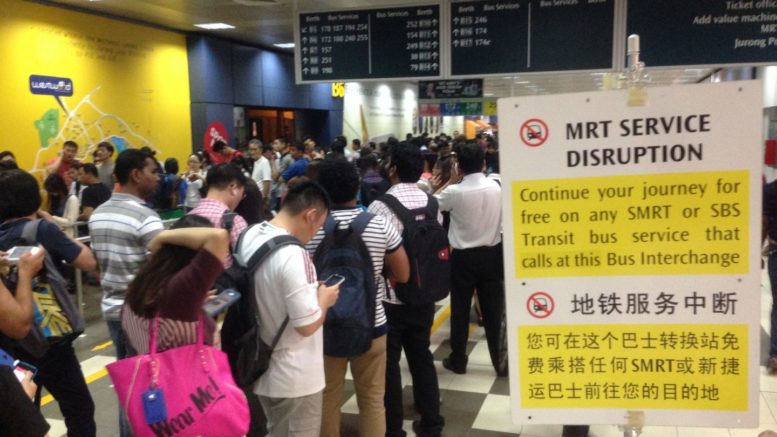How can MRT reliability be said to have improved 3 times, when there are so many breakdowns?
I refer to the article “Khaw Boon Wan sets new rail network reliability target as MRT becomes three times as dependable as in 2015” (Straits Times, Jul 27).
Ownself delude ownself?
It states that “The MRT system’s reliability has improved by three times since Mr Khaw Boon Wan moved to the Transport Ministry in 2015, but the minister wants to raise the bar much higher.
Speaking at the fourth joint forum on infrastructure maintenance organised by SMRT on Thursday (July 26), the Coordinating Minister for Infrastructure and Minister for Transport said that in 2015 – the year he replaced Mr Lui Tuck Yew at the ministry, Singapore’s MRT trains travelled an average of 133,000km between delays of more than five minutes.
This is known as mean km between failure (MKBF).
Ownself exclude ownself?
In the first half of this year (2017), “it has happily gone up to nearly 400,000 (393,000) train-km”. Mr Khaw said this was based on preliminary data, and had also excluded delays arising from the testing of a new signalling system on the North-South line.
Comment: To exclude the “delays arising from the testing of a new signalling system” – we have conveniently evaded all the frequent and extensive delays that have happened recently.
The minister noted that all five lines had improved, with the star performer being the North-East line, which clocked nearly 1 million (978,000) train-km between failures.
“This is a satisfactory outcome, against our targets of 300,000 MKBF this year, 400,000 MKBF next year and 800,000 train-km by 2020,” Mr Khaw said, adding that he set these targets last year against the best-in-class Taipei Metro, which clocked 800,000 MKBF.
Comment: Does the Taipei Metro exclude delays due to certain reasons like what we are now doing in Singapore?
But since then, he noted, Taipei Metro has improved further by achieving 1 million MKBF.
Ownself praise ownself?
“So I am upping our 2020 target from 800,000 to 1,000,000 train-km,” he declared. “LTA (Land Transport Authority) and the operators are working closely towards this target.”
At one million train-km, the system would be 7.5 times more reliable than it was in 2015.
Comment: So, if we count the delays due to “testing of a new signalling system” – how many times less reliable are we now?
Ownself deny ownself?
The minister noted that the number of major breakdowns (those lasting more than 30 minutes) had also fallen to three in the first half, from 10 same period last year.
These exclude the numerous delays arising from resignalling tests on the North-south line.
Mr Khaw said the London Underground and Taipei Metro had forewarned of teething problems when a new signalling system is installed, and that he had highlighted this in Parliament early this year.
“While there will still be delays, if we have done our best to minimise them, I am sure Singaporeans will be understanding and forgiving,” he said.
With progressive software upgrades, the overall resignalling programme has been “smoother than what we had feared”.
Comment: Singaporeans are normally very “understanding and forgiving”, but they may not be so, when you keep “ownself praise ownself”!
Ownself don’t blame ownself?
The only exception was a major disruption on June 28, which Mr Khaw said was caused by a error on the part of Thales – the system supplier.
“By mistake, a Thales’ engineering team connected an incompatible radio to the radio backbone network of the North-South line and the Tuas West Extension… This caused a sudden congestion on the network which resulted in all North-South line and Tuas West Extension trains “losing radio communications”.
Ownself dreaming ownself?
“We have all learnt from this, and such an error will not happen again,” the minister said.
He added that the new signalling system should stabilise before year-end “if there are no new surprises”.
Resignalling on the East-West line will follow after that, and that exercise “should be faster, as we can port over the lessons from our experience in North-South line”
Leong Sze Hian
